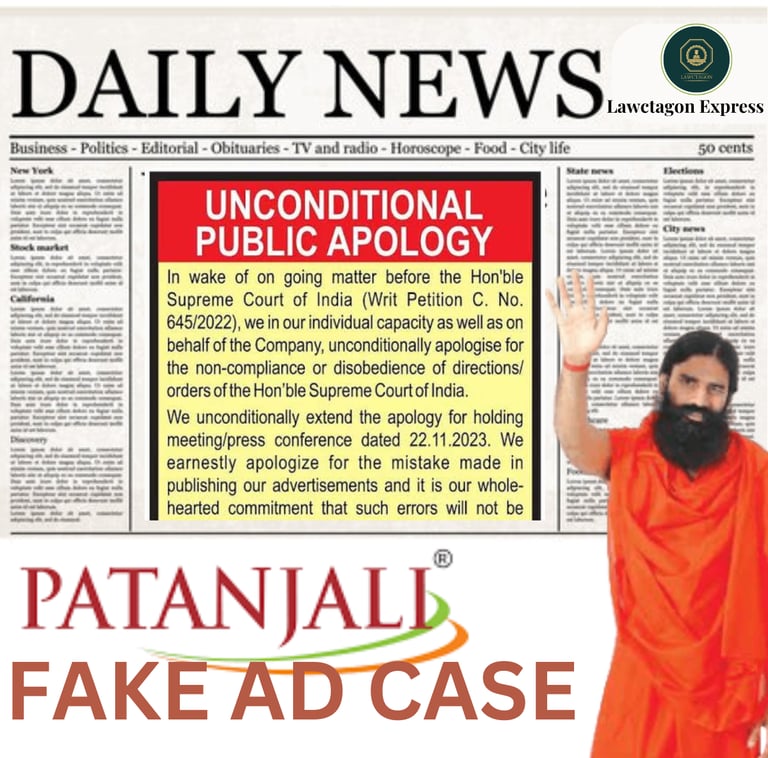Patanjali Misleading Advertisement Case
In this blog, the author explores Patanjali Ayurved's history of misleading advertisements. It details legal challenges, including the Indian Medical Association's petition and Supreme Court interventions, as well as actions by the Uttarakhand State Drug Licensing Authority. The blog also discusses the relevant laws and raises critical questions about advertising standards and regulatory reforms.
Author- Ananya, Co author- Suraj
5/30/20244 min read
History of Patanjali wrt Misleading Advertisement
Patanjali Ayurved, founded by Baba Ramdev and Acharya Balkrishna in 2006, is an Indian multinational conglomerate specializing in natural and herbal products. Known for its wide range of Ayurvedic medicines, personal care items, and food products.
Patanjali Ayurved, like any other company, used to advertise their products. But they started coming into controversy during the late 2nd decade of the 21st century, especially during the Covid pandemic. Not only Baba Ramdev slammed the allopathic field of medicine, products like “Coronil”, by which Patanjali - without any basis - claimed to be a “cure” for covid, and “Madhunashin”, through which Divya (a Patanjali sub-brand) claimed to “cure the incurable diabetes”, attracted a lot of traction from supporters and critiques alike.


The turning point came on 12th August 2022 when the Indian Medical Association filed a petition in the Hon’ble Supreme Court against false and misleading claims made by many companies including Patanjali as one of the biggest parties. The petition came after Patanjali published an ad against allopathy in newspapers on 10th July 2022. The title of the ad was “Misconceptions spread by Allopathy, save yourself and the country from the misconceptions spread by pharma and medical industry. Let’s make India disease-free.” In the same ad, Patanjali had claimed to have completely cured ailments like liver cirrhosis, diabetes and whatnot.
This was a bold and targeted statement. Similar campaigning had been done by Patanjali where they tried to exploit the patriotism of the citizens. As a result, the Indian Medical Association filed the above-mentioned petition accusing Patanjali of violating the Drugs and Magic Remedies (Objectionable Advertisements) Act, 1954.
Patanjali and the Supreme Court
The Hon’ble Supreme Court on 21st November 2023 warned Baba Ramdev and Acharya Balkrishna led Patanjali, to immediately stop its false and misleading advertisements. The apex court asked Patanjali not to release casual statements against any system of medicine and sought an undertaking that it wouldn’t violate any law.
However, Patanjali continued the advertisements through mass media. This action against the court orders was heavily reprimanded by the SC on 27th February 2024. The court restrained Patanjali Ayurved from advertising and branding the products which were violative of the Drugs and Magic Remedies (Objectionable Advertisements) Act, 1954, essentially which claimed to “cure” the uncurable. In the same hearing, the court 1) issued contempt proceedings against Patanjali, 2) questioned neglect by the Ministry of Ayush.
On 19th March 2024, the apex court asked yoga guru Baba Ramdev and Acharya Balkrishna to be present in person on 2nd April 2024. On 22nd April 2024, Patanjali issued a public apology in newspapers which funnily covered a lot less space than Patanjali’s usual adverts. Court took notice of this fact and Patanjali had to once again, on 24th April 2024, issue a public apology in the national newspaper with a much bigger ad.
The case is presently going on in the SC.
Patanjali and the Uttarakhand State Drug Licensing Authority
During the SC proceedings, the court questioned the slumber of the Uttarakhand State Drug Licensing Authority since 2018. The court asked what the authority was doing since 2018 when complaints against misleading ads started.
In a recent development, the authority has filed cases against Patanjali in the Haridwar court. Further, on April 15th 2024, the authority banned 14 products of Patanjali Ayurved and Divya Pharmacy under Rule of the Drugs and Cosmetics Rules, 1945. The products are namely Patanjali Drishti Eye Drop, Madhunashini Vati Extra Power, Bp Grit, Swasari Gold etc
Now before moving forward, let us understand what the law says.
Drugs and Magic Remedies (Objectionable Advertisements) Act, 1954
The Patanjali case is about misleading advertisements under the Drugs and Magic Remedies (Objectionable Advertisements) Act, 1954. This Act prohibits such advertisements of drugs and remedies that claim to have magical qualities. Promoting a product this way is a cognizable offence under Section 9A of the Act (inserted by an amendment with effect from 07th of December, 1963).
Section 2(c) of the Act defines magic remedies. In simple words, magic remedy means “any object which is claimed to have miraculous powers to cure, diagnose, prevent or mitigate a disease in humans or animals.” The Act prohibits the advertising of drugs and remedies, among other diseases, for curing, diagnosing or preventing any disease or condition mentioned in its schedule such as Heart Diseases, Diabetes, Obesity, Epilepsy, Typhoid Fever, Tumors, Tuberculosis etc.
According to Section 7 of the Act whoever contravenes any of the provisions of this Act shall be punished in case of first offence with a maximum sentence of six months or fine or both. In case of repeat offenders, the punishment shall be a maximum of one year with a fine.
This law at times is subject to criticism because of the non-inclusion of diseases like AIDS in the schedule. And because many of the diseases in the schedule are now curable.
There is also Rule 170 of the Drugs and Cosmetics Rules,1945 which deals with objectionable advertisements of ayurvedic drugs.
Challenges that need to be addressed
1. What penalty should the apex court levy on Patanjali to set a precedent? Considering Patanjali has potentially affected millions of people with its false advertisements.
2. What standard of guidelines shall be put out for medicine companies and other FMCG companies (eg. Bourn Vita) to follow during advertisements?
3. Is the Drugs and Magic Remedies (Objectionable Advertisements) Act, 1954 still a legitimate law considering it faces criticism for being outdated?
4. Is there a need to redefine the powers of the Advertising Standards Council of India?
Conclusion
Patanjali Ayurved, founded by Baba Ramdev and Acharya Balkrishna in 2006, faced significant controversy due to misleading advertisements, especially during the COVID-19 pandemic. Claims like "Coronil" curing Covid and "Madhunashin" curing diabetes drew sharp criticism. On August 12, 2022, the Indian Medical Association filed a petition against Patanjali for false claims, following a controversial anti-allopathy ad. The Supreme Court intervened, warning Patanjali to cease such advertisements. Despite this, Patanjali continued, leading to further legal actions. On April 15, 2024, the Uttarakhand State Drug Licensing Authority banned 14 Patanjali products. The case, centers around violations of the Drugs and Magic Remedies (Objectionable Advertisements) Act, 1954, is ongoing. This act prohibits advertisements claiming magical cures, and non-compliance can result in significant penalties. The situation raises broader questions about advertising standards and the relevance of current laws.




